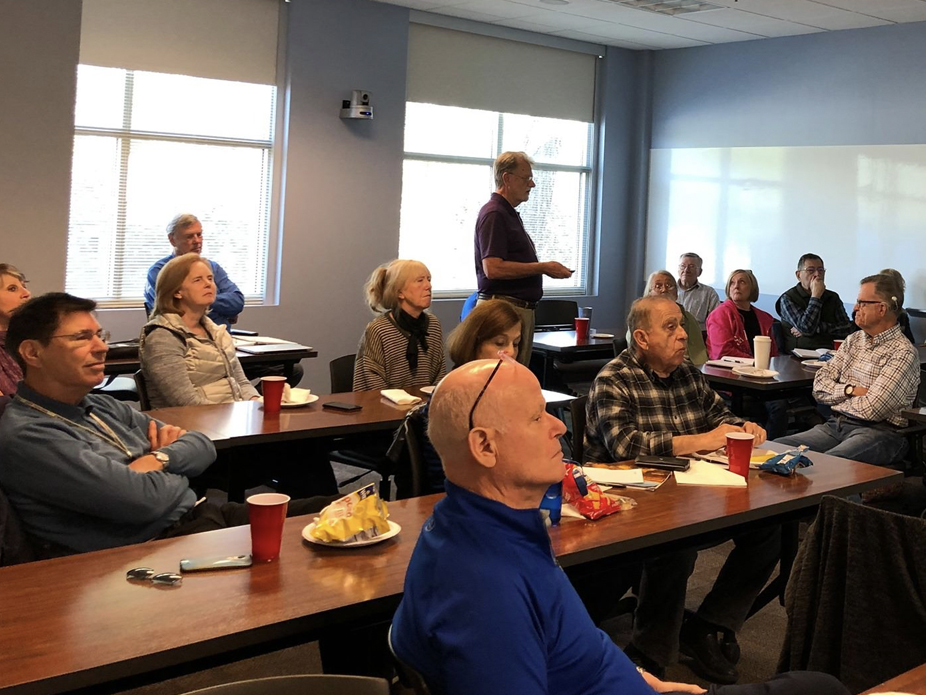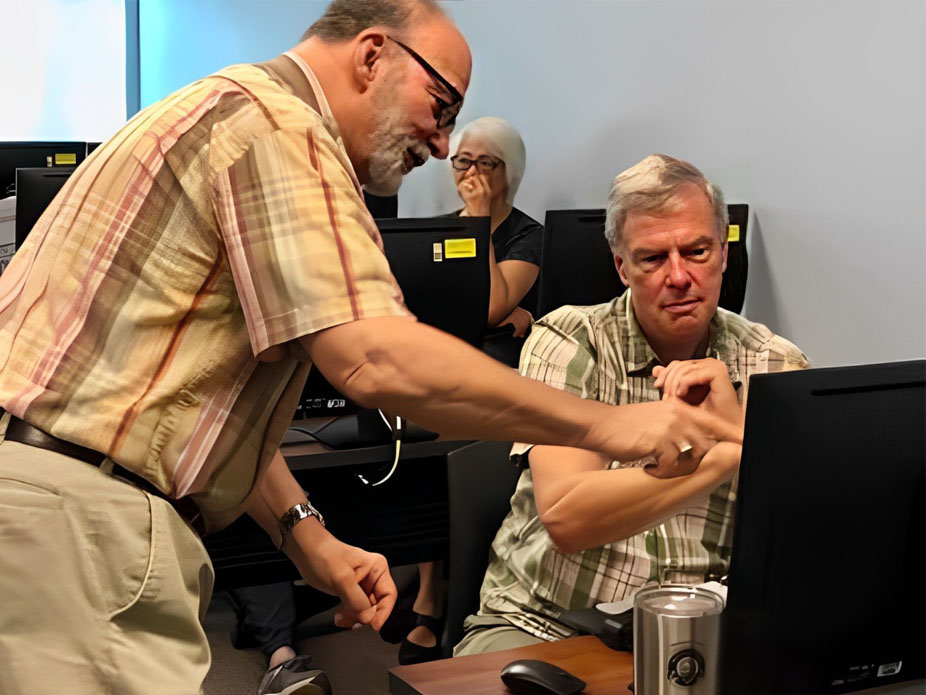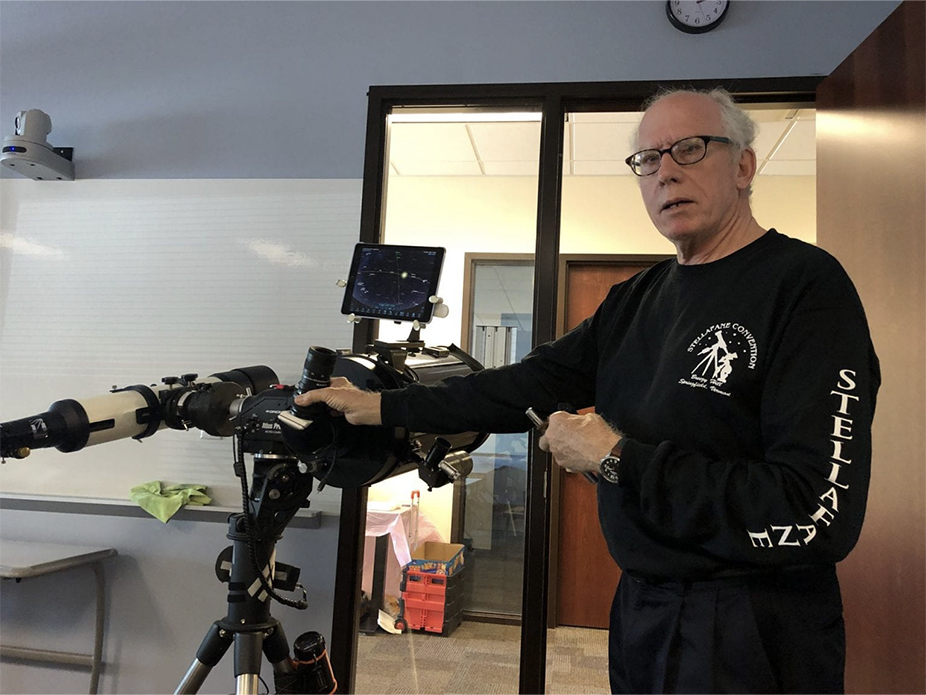Lifelong Learning
Charleston Area Lifelong Learning (C.A.L.L.) offers a series of multi-week classes that are fun to learn and provide more in-depth experience than offered at CCR's Monday lectures. C.A.L.L. also provides a great way to meet and make new friends who share similar interests.
All C.A.L.L. courses are $25 each.
You do not need to be a Center for Creative Retirement (CCR) member to take C.A.L.L. classes.
C.A.L.L. Catalog
Click here for a printable copy of the complete Winter/Spring 2026 C.A.L.L. catalog.
C.A.L.L. Catalog Spring 2026Learn about CALL classes
-
The Nuts and Bolts of Emotional Intelligence
Tuesday Mornings 10 to 11:15 AM – In person at the Riley Center & Via Zoom
(for four weeks, Feb. 17 & 24; Mar. 3 & 10)At a time when technological developments are soaring, emotional intelligence is the critical skill of the 21st century. Learn what emotional intelligence is, its physiological basis, how to use it in your work and personal life, and ways in which to raise your emotional intelligence. Join presenter Ronda Muir and explore the following topics:
Week 1: the History of development of emotional intelligence theory,
Week 2: the physiological basis of emotional intelligence,
Week 3: the personal and industrial uses of emotional intelligence skills, and
Week 4: ways to raise emotional intelligence.Facilitator Ronda Muir, founder of Law People Management LLC, is a leading authority on emotional intelligence and the author of the American Bar Association & best-selling Beyond Smart: Lawyering with Emotional Intelligence, a comprehensive guide to understanding, using and raising emotional intelligence, now in its second edition.
-
Welcome to Iran, Land of the Aryans
Tuesday Afternoon– 12:30 to 2:30 PM In person at the Riley Center & via Zoom
(March 10 Only!!)Iran was the center of the world for nearly 1500 years and certainly the center of attention for the last 55 years. This presentation is an overview of Iran’s 3000-year history, religion, culture, politics, climate and geography with special emphasis and insight into Zoroastrianism, Sharia Law, the Sunni-Shiite rift, our CIA coup and the revolutions of the 20th century, followed by my photographic tour of Iran with historical commentary in May of 2000. It is also the story of my eight-day personal and private adventure traveling alone through Iran with my prearranged Iranian guide who was an English professor at Tehran University. Since his hobbies were studying world history and world religions, I received a crash course in the real Iran. His main job was to keep me away from the 30%. In spite of his best efforts, there were still “incidents and accidents” that happened along the way.
Facilitator Dr. G. Preston Burns grew up in Fredericksburg, Va., graduating from UVA with a degree in Economics in 1969, and the Medical College of Va. School of Dentistry in 1973. He is the author of two books. “Never Turn Down A Ride” is the story of his hitchhiking alone 10,000 miles around the US, coast to coast starting with only $20, no credit card or cell phone in 56 days. “Leadership Under Fire” is the reranking of the presidents’ performances in office according to Adam Smith’s principles in “The Wealth of Nations”. He has also given lectures on dental procedures that he developed and his personal adventures to Iran and Timbuktu. He still resides in Fredericksburg.
-
Yoga: Chair Yoga & Practice
Tuesday Afternoons – 12:30 to 2 PM In person at the Riley Center (Feb. 10, 17 & 24; Mar. 3 & 17 (No March 10 class)
Yoga is a practice that combines benefits for body, mind and spirit. It can help individuals create balance, strength, mobility, calm, and clarity. Through movement, stillness, and breath, we can improve physical health, mental well-being, and overall quality of life. Each class will include a 60-minute chair yoga practice for the participants. Chair yoga is a modified form of yoga where poses are practiced while seated or using a chair for support. It is a gentle practice, for all skill levels (including beginners), that is accessible to people of all ages and abilities. It is a great alternative for those who find traditional yoga too challenging. We will practice poses that will help create more flexibility and strength. The class will also include a 30-minute classroom component where we will explore the benefits of yoga as we age, the 8 limbs of yoga, the kosha layers and doshas, the chakra system, and meditation and relaxation. This class is designed for new participants and as a continuation for those who joined Joy for last term’s course.
Facilitator Joy Bartholomew is a certified yoga teacher, with a 500-hour certification in various forms of yoga, to include mat, chair and aqua practices. Her course work focused on anatomy and alignment, trauma-informed, and various styles of yoga (Hatha, Bhakti, Gentle, Vinyasa and more). She has been practicing yoga for 20 years and teaching for 8 years. She is also a meditation facilitator, helping people to connect to a deeper level through the mindfulness practice. She is a recent South Carolinian, moving to Summerville in 2023, after retiring as a Montgomery County, Md. police officer for 30 years. She relocated with her mom and her fiancée to enjoy the best of Charleston in retirement. With 2 kids in college and a son in the Marine Corps, she and her fiancée travel to visit family as well as vacation abroad as often as possible.
-
Everyday Physics
Wednesday Mornings – 10 to 11:30 AM at the Riley Center (for five weeks, Feb. 11 through Mar. 11)
Course Description: Everyday Physics focuses on the interactions we have with our environment. The second and fourth classes on color and sound are the same as the class from 2018, but the other three are new this year. Join us as we explore a topic a week for five weeks. Classes may be taken individually if you cannot attend them all:
Week 1: Home Comfort. In this session, we talk about heat, temperature, humidity, and infrared radiation and how they are created, perceived, and managed in our homes to achieve a sense of comfort.
Week 2: Appreciating the View in Color. In this session, we explore the process of creating color images in our brains from the sources of light through interactions with pigments and dyes to perception by the eye and brain.
Week 3: At Home with Electricity. In this session, we talk about the nature of electricity and how it’s used in our lives to illuminate, cook, heat, power our electronics, and our cars. We also look at the option of adding solar power.
Week 4: The Sounds in our Lives. Physics for Music Lovers explores the physics of sound, how musical instruments create sound, how concert halls redirect it to the audience. We discuss how we perceive direction and distance and how our brains use this information to discriminate between sources. We also explore how these features affect hearing aids.
Week 5: Driving and Owning a Car. In this session, we explore the physics of a moving vehicle and how it is affected by our choices for steering, braking, and accelerating. We consider the vital electrical components and how hybrid and all-electric cars might make a difference in our daily lives.Facilitator Professor John Preston taught at Eastern Michigan University for 30 years. He developed bachelor's degrees in energy and facility management and taught computer applications and project management. He received the Teaching Excellence Award from his own University and International recognition as Teacher of the Year from the International Facility Management Association. John co-founded EnTech, a computer software company specializing in energy management, co-authored more than sixty books on computer applications and the future of computing, and co-authored a book on project management with Charleston native Russ Darnall. John’s most recent book is Silicon Intelligence: An Introduction to Artificial Intelligence. John has degrees in physics and physics education and enjoys preparing talks on the relevance of physics to everyday life and to other fields of study such as art, music, history, and philosophy.
-
It’s the Economy, Stupid
In developing a presidential campaign strategy in 1992, James Carville coined the statement “It's the economy, stupid.” In 2024 that still seemed to hold true, and will likely do so in upcoming elections. Today, we might add “It’s the perception of the economy, stupid.” During both the Biden and Trump administrations, economists and government officials noted that the macroeconomic numbers looked good, but people's perceptions of the economy were negative. Analysts believe that Trump won the 2024 election because voters believed he could improve the economy. Now his approval numbers on the economy are down even though the macroeconomic numbers still look good. This course will meet for 3 sessions to look at:
1) the macroeconomic economy, especially inflation, employment, and economic growth;
2) what factors might be affecting the macroeconomic numbers such as interest rates, tariffs, and technology;
3) and why people’s perceptions are what they are.The course will consist of lecture and class discussion.
Wednesday Afternoons – At the Riley Center
(for three weeks, Feb. 18 and 25 and March 11 (skipping 3/4) 12:30 to 2 PMFacilitator Nancy Barry has a Ph.D. in economics. She has taught at various colleges and universities, including most recently as an adjunct professor at the College of Charleston. Mid-career Nancy left academia to work as an economist at the Government Accountability Office. She specialized in work dealing with the oversight of financial institutions but was also involved in analyzing policy related to housing finance, homelessness, spectrum management, and aviation and mobile phone competition.
-
The American Revolution at 250, North and South
Thursday Mornings 10 to 11:30 AM –Via Zoom Only (For three weeks, Feb. 12, 19 & 26)
Course Description: Join us for a celebration and review of the history of the American Revolution from Massachusetts to Georgia, covering all 13 colonies as they separate from the Crown. We will examine the people, events, battles, and resolution of the American Revolutionary War.
Facilitator Russ Hutchins, EDSp, a retired school Administrator, has been an OSHER Lifelong Learning Instructor since 2013 and has presented lectures for the University of Kansas, University of West Virginia, Clemson University, and the College of Charleston. His classes have focused on American history and biographies.
-
Improv for Fun & Connection
Thursday Afternoon – 12:30 to 2 PM Riley Center (One-Day Workshop, March 19)
Course description: Curious about improv - but don't want pressure, performing, or being "put on the spot"? This class is designed especially for adults who want to have FUN, stay mentally flexible, and connect with others in a relaxed, supportive environment. No experience necessary. Everyone is welcome!
Facilitator Patti Moynihan has trained in Improv at the wonderful Theater 99 in downtown Charleston. Previously she studied and performed at multiple theaters in the Atlanta, GA, area. She works as a therapist in Mt Pleasant.
-
Reader’s Theatre: Fun with Monty Python
Friday Mornings – 10:30 to Noon Riley Center Conference Room (for six weeks, Feb. 13 through Mar. 20)
Course description: Continuing our tradition of offering a Reader’s Theatre, we will take a break from great literature—we read Shakespeare’s The Tempest last term—and enjoy a bit of British humor. We’ll both watch the skits and act out some of the comedy group’s iconic sketches.
Facilitator Diana Barth taught English literature at the secondary school level and worked as a newspaper reporter. She earned her law degree later in life and was admitted to the bars of Maine and Massachusetts, practicing family and regulatory law. Now retired, she has returned to her love of learning and literature, serving as the head of the committee for Charleston Area Lifelong Learning.
-
One Term Presidents
Thursday Mornings – 10 to 11:30 AM Via Zoom Only (For three weeks, April 7, 14 & 21)
Course Description: We will examine the Presidents only serving one term or less from John Adams to Joe Biden. We will look at their accomplishments, mistakes, and failures. Join us for a tour of the Presidency and how it has changed.
Facilitator Russ Hutchins, EDSp, a retired school Administrator, has been an OSHER Lifelong Learning Instructor since 2013 and has presented lectures for the University of Kansas, University of West Virginia, Clemson University, and the College of Charleston. His classes have focused on American history and biographies.
CALL Registration is now open
- Courses are $25 each
- Register
- Online (preferable)
or - By email at CAforLifelongLearning@gmail.com. You can complete your registration on the first day of class.
- Online (preferable)
- You do not need to be a Center for Creative Retirement (CCR) member to take C.A.L.L. classes.
Would you like to teach?
The Lowcountry has attracted a plethora of your peers who have interesting topics to share. We are always looking for facilitators willing to share interesting topics. Class topics have ranged from gardening to elections, poetry to physics. Facilitators earn a stipend of $150 per course.
Request a Course Submission FormLearn. Teach. Connect.




